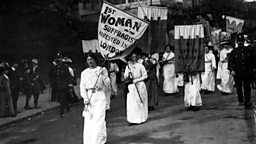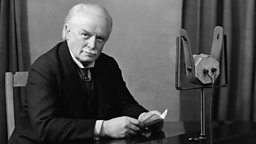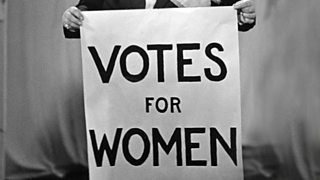The 'populist' world leader that refused to meet women
By Ciaran Bermingham (Assistant Producer, Home Front)
In January 1917 a deputation of suffragists arrived at Downing Street seeking to meet with David Lloyd George. They were given short shrift. The new Prime Minister, they were told, “is not prepared at this present moment to receive a deputation on this subject [votes for women]”.

He perhaps had reason for his entrenchment. Just the following day anti-war activist Alice Wheeldon and her two daughters were arrested in Derby for supposedly planning to assassinate him. Though it has since emerged that their apparent co-collaborator was in fact an infiltrator from the fledgling MI5, the press sensation it caused at the time was more than enough fuel for those seeking to demonstrate the dangers of giving women more rights.
It would be a busy week for Lloyd George’s newly-formed War Cabinet. Just a few days later, a previously cautious United States of America joined the war on the side of the Allies following Germany’s announcement of unrestricted submarine warfare. Interestingly on the other side of the pond, a women’s suffrage group called the Silent Sentinels had just begun a two-and-a-half year long vigil outside President Wilson’s White House. For their efforts, they would be subjected to violence and harassment later that year.
One popular narrative is that Lloyd George “gave” women the vote as a “reward” for their work in WW1, reinforcing his well-crafted image as a reformer. Certainly, as we convey in Home Front, there can be no doubt that women’s contribution to the war effort was vital, whether it was in nursing, agriculture or helping to produce munitions.

It is also true that in 1914 the Women’s Social and Political Union (WSPU) stopped direct action on property and that their iconic leader, Emmeline Pankhurst, quickly set about voicing support for the Government’s recruitment drive at rallies around the country (portrayed in Home Front by Dame Harriet Walter). Indeed, only 18 months before the prominent suffragette had been arrested for supporting the blowing up of Lloyd George’s (the then Chancellor’s) country pile.

However, the idea that all suffrage campaigners unanimously ceased their activities as soon as war broke out in favour of patriotic fervour and volunteerism is a myth. Splintering from the WSPU, which had fragmented by 1917, the Women’s Freedom League and Sylvia Pankhurst’s East London Federation of Suffragettes were both as committed to a continued campaign for universal adult suffrage as they were to bringing about a peaceful end to the war.
Between organising peace rallies and running a model factory, the more radical Sylvia had campaigned against the draconian working conditions which she accused Lloyd George of overseeing in the Ministry of Munitions. As a socialist, she was acutely aware that because of property qualifications most men could not vote either, though there was a growing public appetite for extending the franchise to soldiers and sailors who had served in the war.
When in January 1917 a Speakers Conference recommended that women should be given a vote on the condition that it be granted only to women over 30, it felt as if millions of young working women who had contributed so much had been deliberately excluded. Apparently supportive of giving limited suffrage to women, Lloyd George would have understood the significance of this caveat. For many of the more liberally-minded members of the Conference, selected by his less-sympathetic predecessor Asquith and with a tokenistic sprinkling of moderate women’s representatives, it was a necessary compromise - a view still taken by many historians.
However, suffragist and writer Ray Strachey responded at the time calling the proposals “timid” and vowed that the National Union of Women Suffrage Societies would continue to demand “that women shall be enfranchised on the same terms as men”. This would not happen until 1928.
More from Home Front
-
![]()
Listen to Home Front
On the day that suffragettes were refused by Lloyd George, Albert Wilson is also disappointed.
-
![]()
Download the podcast
Download Home Front to your smartphone.
-
![]()
Meet the characters
Meet the characters of the wartime drama series.
-
![]()
In Our Time: Suffragism
Melvyn Bragg and guests discuss suffragism.




